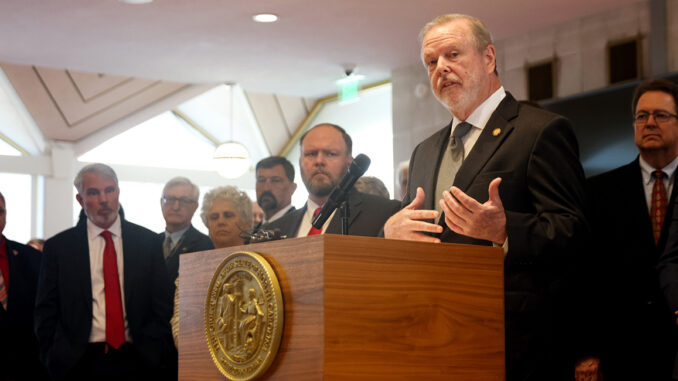
RALEIGH — Following the November election, there were party seat shifts in both chambers of the General Assembly as well as at the Council of State.
Heading into 2025, Senate Leader Phil Berger (R-Eden) and newly elected House Speaker Destin Hall (R-Granite Falls) will lead the North Carolina General Assembly. Hall takes over for House Speaker Tim Moore (R-Kings Mountain), who heads to Washington, D.C., as North Carolina’s 14th District congressional representative.
The House lost its supermajority by one seat following the results of the November election. Despite that seat loss, in a postelection press conference, Moore said he was “completely confident” overrides could still be conducted and there are a “handful of Democrats” who will work with Republicans. Hall has echoed similar sentiments.
New faces at the General Assembly in the Senate include four Democrats and two Republicans, representing districts across Wake, Granville, Durham, Forsyth, Stokes, Mecklenburg, Caldwell and Catawba counties: District 18, Terence Everitt (D); District 22, Sophie Chitlick (D); District 31, Dana Caudill Jones (R); District 41, Caleb Theodros (D); District 42, Woodson Bradley (D); and District 45, Mark Hollo (R).
For the House, the number of new representatives is nearly evenly split with 11 Democrats and 12 Republicans. The counties covered in these House districts include Onslow, Wilson, Halifax, Northampton, Warren, Granville, Vance, Wake, Cumberland, Guilford, Montgomery, Stanly, Cabarrus, Rowan, Alexander, Wilkes, Iredell, Lincoln, Mecklenburg, Cleveland and Buncombe counties.
The new representatives are: District 14, Wyatt Gable (R); District 24, Dante Pittman (D); District 27, Rodney D. Pierce (D); District 32, Bryan Cohn (D); District 33, Monika Johnson-Hostler (D); District 35, Mike Schietzelt (R); District 42, Mike Colvin (D); District 57, Tracy Clark (D); District 59, Alan Branson (R); District 62, John M. Blust (R); District 67, Codey Huneycutt (R); District 73, Jonathan Almond (R); District 82, Brian Echevarria (R); District 83, Grant Campbell (R); District 94, Blair Eddins (R); District 95, Richard “Todd” Carver (R); District 97, Heather H. Rhyne (R); District 98, Beth Gardner Helfrich (D); District 100, Julia Greenfield (D); District 107, Aisha O. Dew (D); District 111, Paul Scott (R); District 112, Jordan Lopez (D); and District 116, Brian Turner (D).
At age 22, Gable will be the youngest to join the General Assembly in 126 years.
Other changes to the top three spots in North Carolina State government on the Council of State include three Democrats: Gov. Josh Stein, Lt. Gov. Rachel Hunt and Attorney General Jeff Jackson.
Stein replaces Gov. Roy Cooper, who served two terms in the Executive Mansion and was also Stein’s predecessor at the N.C. Department of Justice. Stein has begun building plans for cabinet and agency leadership using vetting groups that include some prominent Republicans.
Hunt will assume the role previously held by Republican Lt. Gov. Mark Robinson, who lost his gubernatorial bid against Stein.
Jackson, who was in his freshman year in Congress for the 14th District, defeated a fellow Congressman, Republican Dan Bishop (N.C.-8th), by around 2.86% of the vote to replace Stein as attorney general. Bishop has since been tapped by President-elect Donald Trump to be a deputy director at the Office of Budget and Management.
While the top three spots went to Democrats, the Council of State seats are now an even five-five party split. While most Council of State meetings consist of fairly routine matters of business mutually agreed upon by most members, any contentious items could see some partisan friction. Any emergency executive orders issued by the governor that pass a Council of State vote must also be approved by the legislature once the order hits the 60-day mark.
Republican incumbent Commissioner of Insurance Mike Causey and Commissioner of Agriculture Steve Troxler retained their seats on the Council of State. Causey defeated statehouse Sen. Natasha Marcus (D-Mecklenburg) by more than 4% of the vote, while Troxler — who has held the seat since 2005 — beat Democratic challenger Sarah Taber by more than 7.6% of the vote.
Republicans also kept the commissioner of Labor spot, with Luke Farley taking over for Josh Dobson, who didn’t seek reelection and resigned from his position on election night. Dobson is now leading the North Carolina Healthcare Association.
Similarly, following the departure of State Treasurer Dale Folwell, the role of state treasurer will continue to be held by a Republican. Folwell ran for governor but lost to Robinson in the March primary. Brad Briner will now assume Folwell’s office, which also oversees the Local Government Commission.
Republican Dave Boliek‘s win flipped control of the state auditor’s office, which a Democrat had occupied since 2009 when former State Auditor Beth Wood first took office. Wood resigned earlier this year following an indictment related to a December 2022 hit-and-run incident she was involved in while driving a state vehicle. The governor appointed former Wake County Commissioner Jessica Holmes to fill the remainder of Wood’s term. Holmes then ran for the seat but lost to Boliek in the general election.
Unless legally challenged, Boliek will now oversee the N.C. State Board of Elections (NCSBE) due to the passage and subsequent veto override of Senate Bill 382. Under that law, the state auditor doesn’t direct or supervise the management functions of the NCSBE but is responsible for its budget. In his role, Boliek would also make appointments to the NCSBE and the chairs of each county board of elections starting in 2025. Currently, those appointments are made by the governor, and a lawsuit on that provision is likely.
Republicans were unable to dislodge Democrat Elaine Marshall, who has held the role of North Carolina’s secretary of state for the past 32 years, having first taken office in 1997. Conversely, Democrats were able to flip the state superintendent seat currently held by Republican Catherine Truitt. The state’s schools chief role will now be held by Democrat Maurice “Mo” Green, who defeated Republican Michele Morrow in the general election by just over 130,650 votes.



